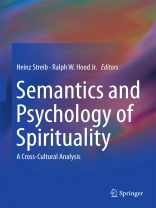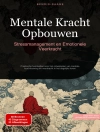This book examines what people mean when they say they are “spiritual”. It looks at the semantics of “spirituality”, the visibility of reasons for “spiritual” preference in biographies, in psychological dispositions, in cultural differences between Germany and the US, and in gender differences. It also examines the kind of biographical consequences that are associated with “spirituality”. The book reports the results of an online-questionnaire filled out by 773 respondents in Germany and 1113 in the US, personal interviews with a selected group of more than 100 persons, and an experiment. Based on the data collected, it reports results that are relevant for a number of scientific and practical disciplines. It makes a contribution to the semantics of everyday religious language and to the cross-cultural study of religion and to many related fields as well, because “spirituality” is evaluated in relation to personality, mysticism, well-being, religious styles, generativity, attachment, biography and atheism. The book draws attention to the – new and ever changing – ways in which people give names to their ultimate concern and symbolize their experiences of transcendence.
Table of Content
Preface.- Introduction.- Part I. Points of Departure.- Chapter 1. Understanding “Spirituality” – Conceptual Considerations; Heinz Streib and Ralph W. Hood Jr..- Chapter 2. Deconversion and ”Spirituality” – Migrations in the Religious Field; Heinz Streib, Ralph W. Hood, Jr. and Barbara Keller.- Chapter 3. Investigating ”Spirituality”: Between Survey Data and the Study of Biographies; Heinz Streib, Constantin Klein and Ralp W. Hood Jr.- Chapter 4. Design, Methods and Sample Characteristics of the Bielefeld-Based Cross-Cultural Study of ”Spirituality”; Barbara Keller, Heinz Streib, Christopher Silver, Constantin Kleinand Ralph W. Hood Jr.- Chapter 5. Who is “Spiritual”?; Barbara Keller, Constantin Kleinand, Anne Swhajor-Biesemann and Heinz Streib.- Part II. Senmantics of ”Spirituality”.- Chapter 6. Is “Spirituality” nothing but “Religion”? An Indirect Experimental Approach; Constantin Klein, Ralph W. Hood Jr, Christopher F. Silver, Barbara Keller and Heinz Streib.- Chapter 7. Semantics Differentials Open New Perspectives on the Semantic Field of ”Spirituality” and ”Religion”; Heinz Streib, Barbara Keller, Constantin Klein, Anne Swhajor-Biesemann and Ralph W. Hood Jr.- Chapter 8. “Spirituality” and “Religion” – Corpus analysis of Subjective Definitions in the Questionnaire; Stefan Altmeyer and Constantin Klein.- Chapter 9. Dimensions of ”Spirituality”; The Semantics of Subjective Definitions; Clemens Eisenmann and Constantin Klein.- Chapter 10. ”Fuziziness” or Semantic Diversification? Insights about the Semantics of ”Spirituality” in Cross-Cultural Comparison (Conclusion); Raph W. Hood Jr. and Heinz Streib.- Part III. Measuring Characteristics and Effects of ”Spirituality”.- Chapter 11. “Spirituality” and Mysticism; Constantin Klein, Christopher F. Silver, Heinz Streib, Ralph W. Hood Jr and Thomas J. Coleman III.- Chapter 12. Personality Dimensions and Versions of ”Spirituality; Heinz Streib, Constantin Klein and Ralph W. Hood Jr.- Chapter 13. Religious Schemata and “Spirituality”; Heinz Streib, Ralph W. Hood Jr and Constantin Klein.- Chapter 14. Coordinates for Mapping ”Spirituality”; Heinz Streib and Ralph W. Hood Jr.- Part IV. Biographical analyses – Methodological Perspectives.- Chapter 15. The Faith Development Interview: Methodological Considerations; Heinz Streib, Michele Wollert and Barbara Keller.- Chapter 16. Narrative Reconstruction and Content Analysis in the Interpretation of ”Spiritual” Biographical Trajectories for Case Studies; Barbara Keller, Thomas J. Coleman III and Christopher F. Silver.- Part V. Varieties of ”Spiritual” Biographies.- Chapter 17. Mapping the Varieties of ”Spiritual” Biographies; Barbara Keller, Ralph W. Hood Jr and Heinz Streib.- Chapter 18. ”…I relly did depend on my faith in God during that time…to see the meaning in my life” – Religious Spirituality; Michele Wollert and Barbara Keller.- Chapter 19. ”Well, not a believer, meaning that I have not found my ideal faith yet. I am seeking” – Spirituality of Religious Seekers; Michele Wollert and Barbara Keller.- Chapter 20. ”Whether these gifts are from God, from Buddha, from the universe, I do not care, I do not care at all…” – Quilt Spiritualties; Barbara Keller and Michele Wollert.- Chapter 21. ”Experimenting with Ideologies…” – A ”More Spiritual than Religious” Zen Buddhist; Thomas J. Colemann III, Anne Swhajor-Biesemann, Derek Giamundo, Christopher Vance, Ralph W. Hood Jr. and Christopher F. Silver.- Chapter 22. ”…if the universe is beautiful, we’re part of that beauty” – A ”Neither Religious nor Spiritual” Biography as Horizontal Transcendence; Thomas J. Coleman III, Christopher F. Silver and Ralph W. Hood Jr.- Chapter 23. Redrawing the Map: Varieties of ”Spiritual”, ”Religious” and ”Secular” Lives; Barbara Keller, Heinz Streib and Ralph W. Hood Jr.- Part VI. Consequences of Being ”Spiritual”.- Chapter 24. Faith Development, Religious Styles and ”Spirituality”; Heinz Streib, Michele Wollert and Barbara Keller.- Chapter 25. Positive Adult Development and ”Spirituality”: Psychological Well-Being, Generativity and Emotional Stability; Constantin Klein, Barbara Keller, Christopher F. Silver, Ralph W. Hood Jr and Heinz Streib.- Chapter 26. Religion, Spirituality and Psychological Crisis; Barbara Keller, Matthew Durham and Femke Houten.- Conclusion.- Chapter 27. The Contribution of the Study of ”Spirituality” to the Psychology of Religion: Conclusions and Future Prospects; Ralph W. Hood Jr, Heinz Streib, Barbara Keller and Constantin Klein.
About the author
Heinz Streib (M.A. 1977, Tübingen University; Ph.D. 1989, Emory University, Habilitation 1995, Frankfurt University) has established the Research Center for Biographical Studies in Contemporary Religion at the University of Bielefeld and has conducted there a series of empirical studies – several of them in cooperation with Ralph Hood (University of Tennessee at Chattanooga). Streib’s major third-party funded research projects are the following: Fundamentalist Biographies (1996-1998, for an Enquete Commission of the German Parliament), Varieties of Deconversion in the USA and Germany (2002-2005), “Spirituality” in Germany and the USA (2009-2012), Xenophobia and Xenosophia between the Abrahamic Religions (2011-2015) and the study of religious development in longitudinal perspective in the USA and Germany (2014/2015 – current). Other research interests include: Theory and research in religious development in terms of religious styles and schemata, violence and inter-religious prejudice in school and adolescents’ readiness for mediation.
Ralph W. Hood Jr. is professor of psychology at the University of Tennessee at Chattanooga. He is a former editor of the Journal for the Scientific Study of Religion and a former co-editor of the Archive for the Psychology of Religion and The International Journal for the Psychology of Religion. He is a past president of division 36 of the American Psychological Association and a recipient of its William James award. He has published several hundred articles and numerous book chapters in the psychology of religion and has authored, co-authored or edited fifteen books, all dealing with the psychology of religion.












